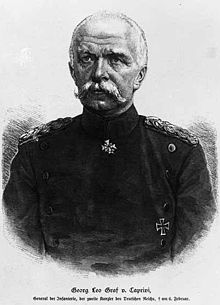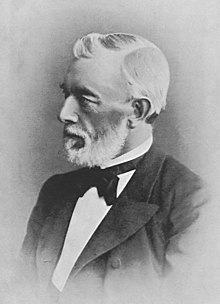New course (German Reich) – Wikipedia
The ” new course “Is a term to designate the domestic political reorientation after the dismissal of Otto von Bismarck in the German Empire. Modern science is mostly equated with the time of Leo von Caprivi (1890–1894). Some representatives of the new course also remained in office under Chlodwig Fürst to Hohenlohe-Schillingsfürst. Wilhelm II has rarely been applied to the foreign policy urge to expand since the second half of the 1890s.
The concept of the “new course” was used in a contemporary manner in the modification of a telegram of Wilhelm II as a political term in April 1890. [first]

The central engine was the Chancellor and temporary Prussian Prime Minister Caprivi. He was supported at least initially by Finance Minister Johannes von Miquel. In the individual policy areas of the Prussian State Ministry, Minister of Commerce Hans Hermann von Berlepsch, Interior Minister Ernst Ludwig Herrfurth and Minister of War Hans von Kaltenborn-Stachau were important co-designers. The State Secretary Karl Heinrich von Boetticher and Adolf Marschall von Bieberstein were added at the Reich level.
The new course initially consisted of turning away from the policy of confrontation and division, as Otto von Bismarck had. Instead, attempts were made to withdraw the monarchical state from the immediate social conflicts and to make it a neutral authority that stood above the social conflicts and moderated. [2] The aim of the Caprivi government was to reconcile the interior, that is, it should be tried to reintegrate the population groups that had been excluded in the era of Bismarck’s era. How much the contemporaries kept reforms, a statement by the later Chancellor Bernhard von Bülow from 1890 makes it clear: “Since 1808 – Stein and Hardenberg – there was no such urge to reform.” [3]
A reform policy, albeit in their goals, should alleviate social conflicts. At the same time, the government tried to create new support after breaking apart the party cartel and overcome the difficult time after Bismarck’s dismissal. Ultimately, it was about the place of the political motionlessness of the Bismarck government of the past decade of a new dynamic. [4]
To a certain extent, this policy was successful in the field of social, foreign trade policy and in a limited form also for Prussian domestic politics.

The opinion of the action in the field of social policy was that the Bismarck attempt to break the influence of the Social Democrats on the workers due to the introduction of social security had failed. In its place, the government now used reform concepts that had already been on the political agenda in the 1870s. Berlepsch primarily relied on the expansion of workers protection and a reform of labor law. [5] This policy was initially supported by Wilhelm II and his idea of a “social empire”. In the February letting the emperor from 1890, still at the time of Bismarck’s Chancellery, she was raised to the official program. [6]
A concrete result was the 1891 commercial order. This prohibited Sunday work, the work of children under the age of 14 in factories was abolished and the working hours of young people and women were restricted. Working in health -damaging companies was also subject to stricter requirements. The trade supervision was reinforced to check the workers protection measures. In addition, there was the establishment of work regulations and commercial courts for the settlement of labor law conflicts between workers and entrepreneurs. However, the draft law originally also contained provisions on tightening the coalition law. At pressure from the center and the free -sensitive party, these passages were painted again. The template was accepted in the Reichstag with a large majority. Only the Social Democrats did not agree because their claims continued. Overall, this policy meant an important step towards the development of welfare structures in the German Empire. [7]
In the field of foreign trade policy, the expiry of trade contracts with France and other countries in 1892 threatens higher tariffs and possibly also real trade wars. In order to counteract this, long-term trade contracts with Austria-Hungary, Italy, Belgium, Switzerland, Spain, Serbia and Romania and finally also with Russia were concluded between 1891 and 1893. This resulted in a trade contract system that was not least used to promote the export of German industrial products. This was the realization that it was not agriculture, but only an expanding industry, could provide enough jobs for a growing population. The central problem was that the advantages of industrial export among contractual partners could only be achieved through concessions in the agricultural tubes. From politics in favor of agriculture, Caprivi postponed the focus in trade policy towards industry. [8]
The reform policy of the new course included not only the empire, but also the relevant politicians tried to enforce changes in Prussia. There, the reform of the municipal code had initially failed in the 1870s. It was tied again. The draft of a new land municipal regulations was combated by the conservatives, and in 1891 they managed to defuse it in the Prussian state parliament in their favor. It was originally planned to put together small communities and neighboring estate districts. The conservatives enforced the consent of the two sides. As a result, the law only had an impact on 3% of the estate districts. Other reform projects in this policy area also failed. The legislation was unable to change the strong position of knight’s owners in Eastelbia. There was hardly any progress in the reform of the Prussian three -class voting right. [9]

In contrast, Finance Minister Miquel’s tax reform was successful. In 1891, a modern income tax was introduced in Prussia. She took the place of complicated class and real taxes. A wide range of income types and sources have now been recorded. The state thus participated in the growing social product. In tax law, too, the transition from agricultural to the industrial state was reflected. A tax -free subsistence level was introduced, a tax progression, albeit, and the possibility of asserting certain deductions. Overall, the lower income groups were relieved, and the principle of taxpayers finally prevailed according to their performance. In addition, trade tax for large companies was introduced. In 1892, basic, building and trade tax were entirely left to the municipalities. This had positive effects on the financial situation of cities and municipalities. In 1893 there was also an asset tax in favor of the country. However, the government was also forced to concessions in this policy area in favor of the large property. Apart from that, the reform brought progress with regard to tax justice. This was also associated with an increase in efficiency of the tax administration. Ultimately, it was possible to put the Prussian state on a better financial basis through a higher tax revenue. [ten]
Due to the crisis around the new school law, the government lost much of the initial willingness to support both at the center and the liberals. With the separation of the office of the Reich Chancellor and the Prussian Prime Minister, this led Caprivi to lose power considerably. Also in the Reichstag, he was increasingly finding it with increasing approval. The next crisis came with the army template from 1892/93. This meant a significant reinforcement of the armaments efforts. To enforce, the Chancellor did not make concessions such as the approval of the military costs every seven, but every four years and the introduction of a service of two instead of three years. But only after a Reichstag resolution and new elections could Caprivi enforce his ideas. [11]
Resistance to the politics of the new course came mainly from a conservative side. The criticism of the trade contracts, which was regarded as an equal to the agriculture, led to the establishment of the Federation of Farmers and finally to radicalize the German conservative party.
Caprivi also lost the support of Wilhelm II. He wanted to make politics more himself and aimed at the establishment of a “personal regiment”. Whether he succeeded remains controversial in research. However, the highlight of imperial influence was only after 1894. A central reason for Wilhelm II’s departure was from the new course that this policy had failed to increase the legitimation of the monarchy. On the contrary, she contributed to driving the conservatives into the opposition. [twelfth]
The end of the actual policy of the new course came in 1894 with the disputes about the overthrow. Opponents of the new course such as the Prussian Prime Minister Botho zu Eulenburg, industrial districts around Carl Ferdinand von Stumm-Halberg, representative of agriculture, the military and parts of the court state campaigned for a new special law against the Social Democrats. But national liberal and free conservatives also joined this. It was crucial for the protagonists of the new course, who rejected a special law, that Wilhelm II stood against the Chancellor. Ultimately, this ended in October 1894 with the dismissal of both Caprivis and Eulenburg. Although some exponents of the new course initially kept their offices under Chlodwig Fürst to Hohenlohe-Schillingsfürst, the opponents had finally largely prevailed. [13]
Hans-Peter Ullmann accounts for the fact that the policy of the new course got some reforms on the way and the stagnation of the late Bismarck years overcame, but the scope of the reforms was limited. They were committed to an “enlightened conservatism” that would not have been up to date. The reforms did not go far enough for a system change, but were too far -reaching so as not to encounter massive resistance. [14]
- ↑ Spenkuch, introduction, p. 3
- ↑ Ullmann, S. 138f.
- ↑ Spenkuch, introduction, p. 4
- ↑ Ullmann, S. 139
- ↑ See source collection on the history of German social policy from 1867 to 1914, III. Department: expansion and differentiation of social policy since the beginning of the new course (1890-1904), 3rd volume, Workers’ protection , edited by Wolfgang Ayaß, Darmstadt 2005; Ibid: 4th volume, Workers’ law , edited by Wilfried Rudloff, Darmstadt 2011.
- ↑ Ullmann S. 139
- ↑ Ullmann, S. 139, Loth, S. 93
- ↑ Ullmann, S. 140
- ↑ Ullmann, S. 140, Loth, S. 94
- ↑ Loth, S. 94
- ↑ Ullmann, S. 142f.
- ↑ Ullmann S. 143f
- ↑ Ullmann, S. 145
- ↑ Ullmann, S. 141
- Wilfried Loth: The Empire. Obraciness and political mobilization. Munich 1996, ISBN 3-423-04505-1.
- Hartwin Spenkuch (editor): The protocols of the Prussian State Ministry 1817-1934/38. Volume 8/I and Volume 8/II: March 21, 1890 to October 9, 1900. Hildesheim/Zurich/New York 2003 (= Acta Borussica New Episode, 1st row: The protocols of the Prussian State Ministry 1817–1934/38)
- Hans-Peter Ullmann: The German Empire 1871–1918. Frankfurt 1995, ISBN 3-518-11546-4.
Recent Comments